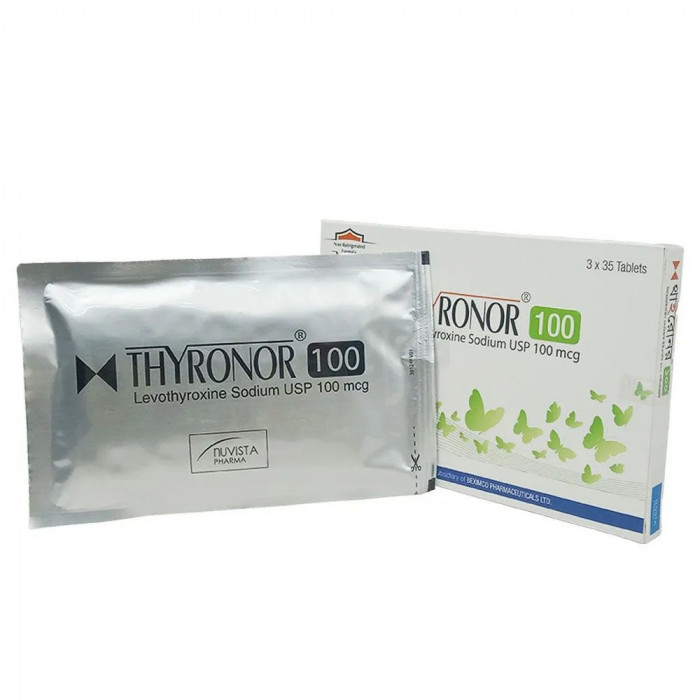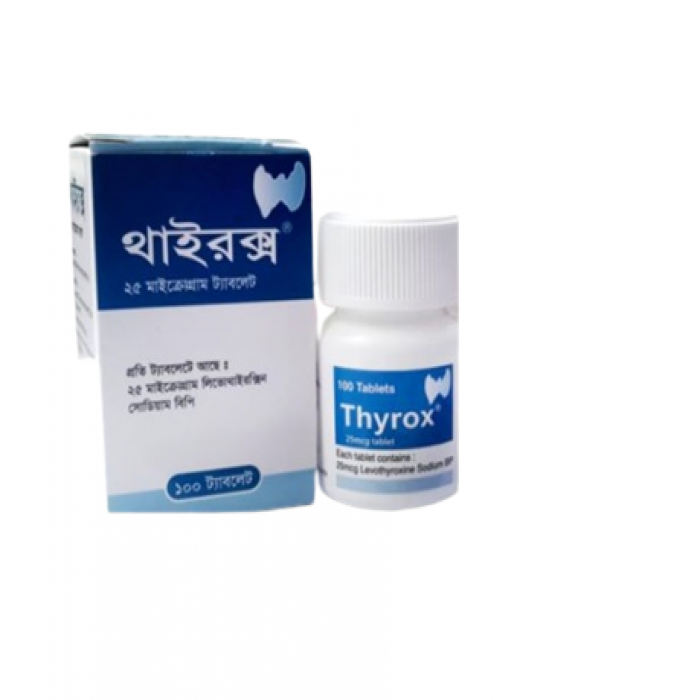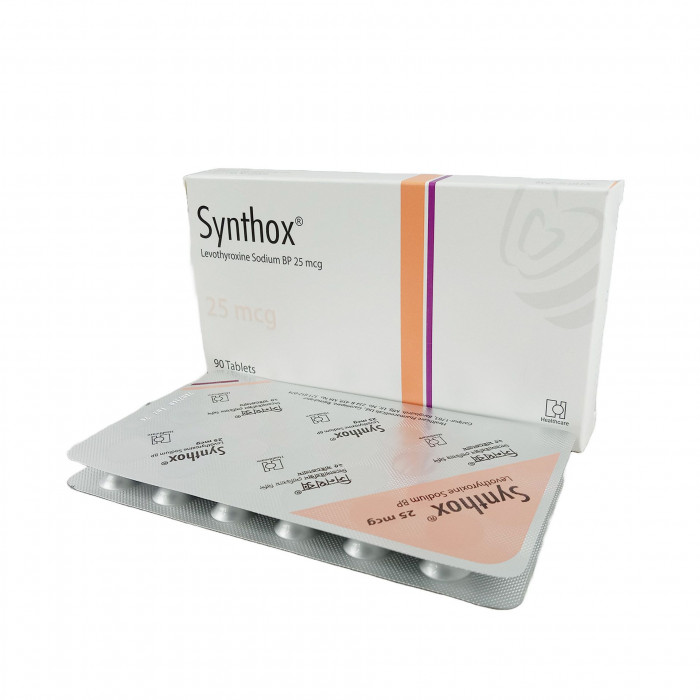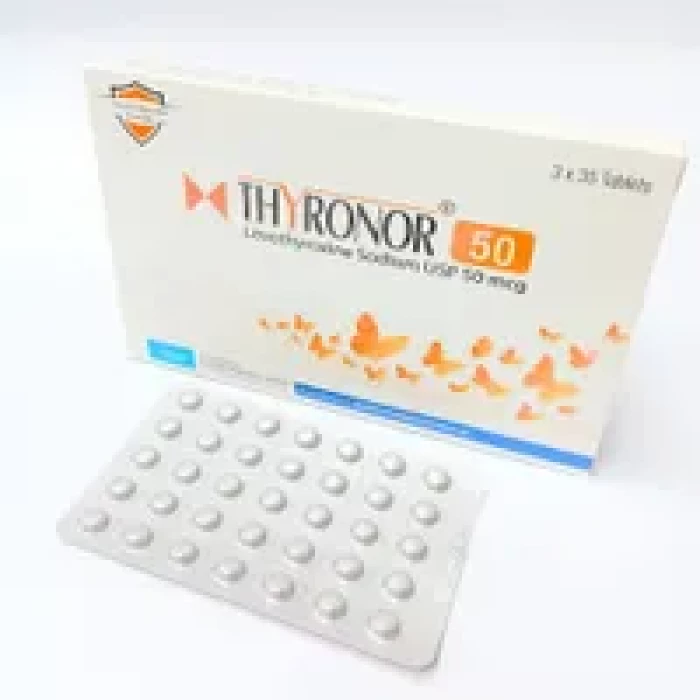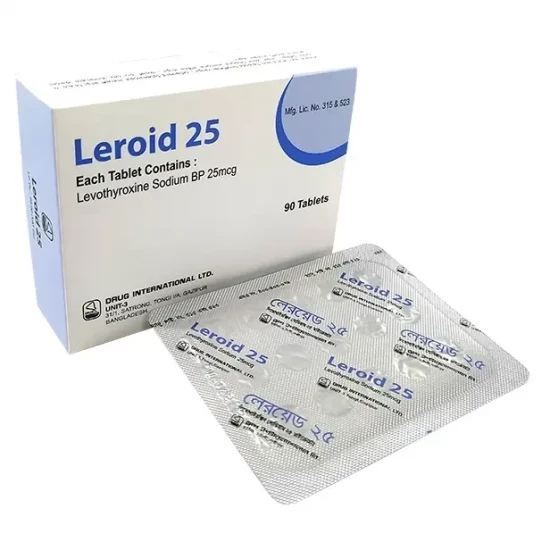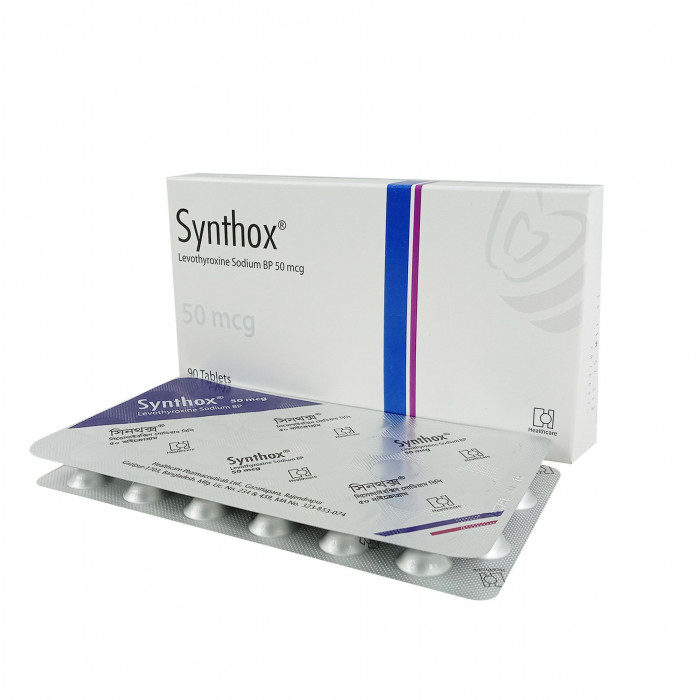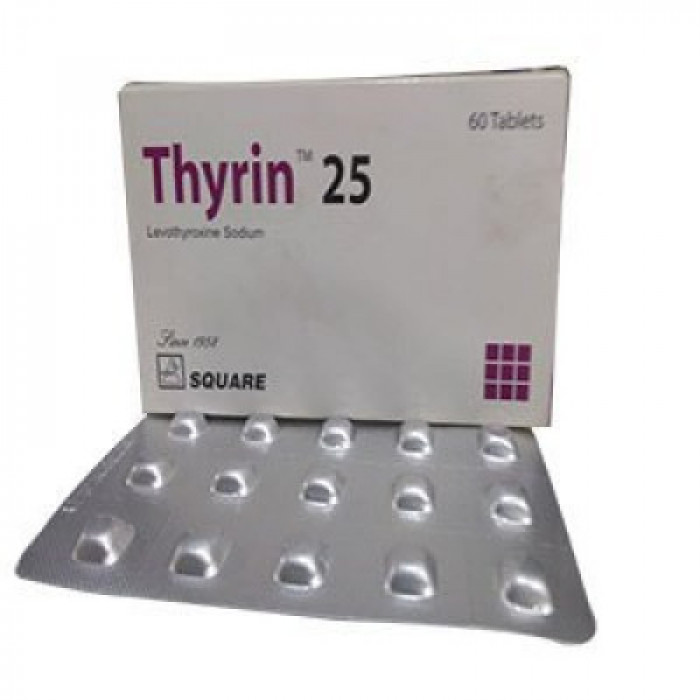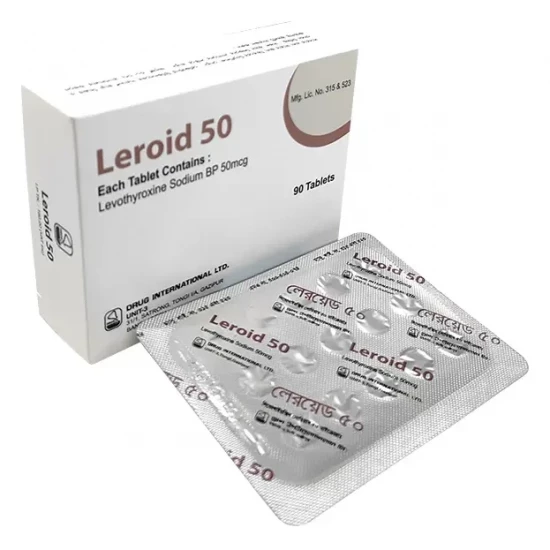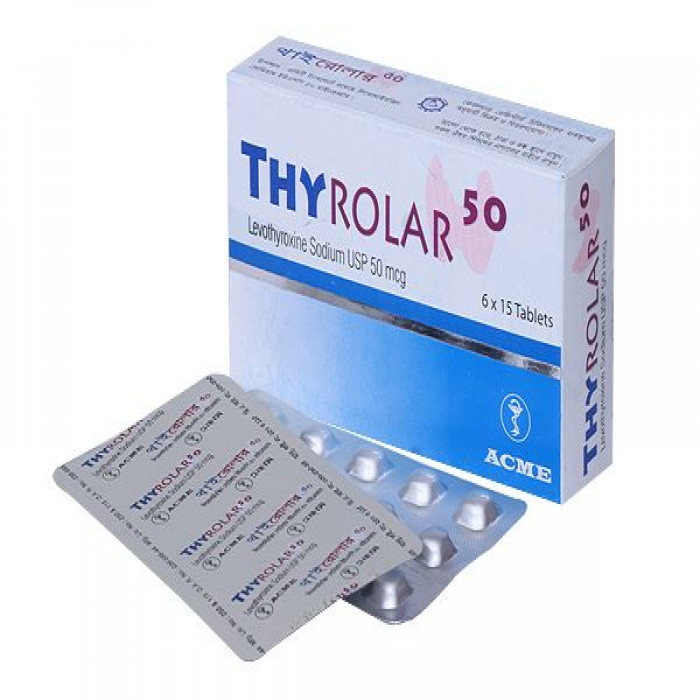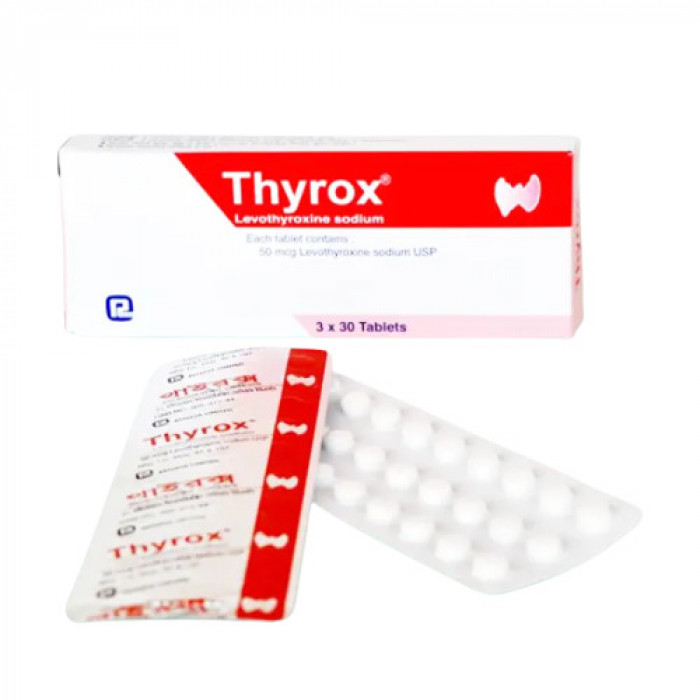
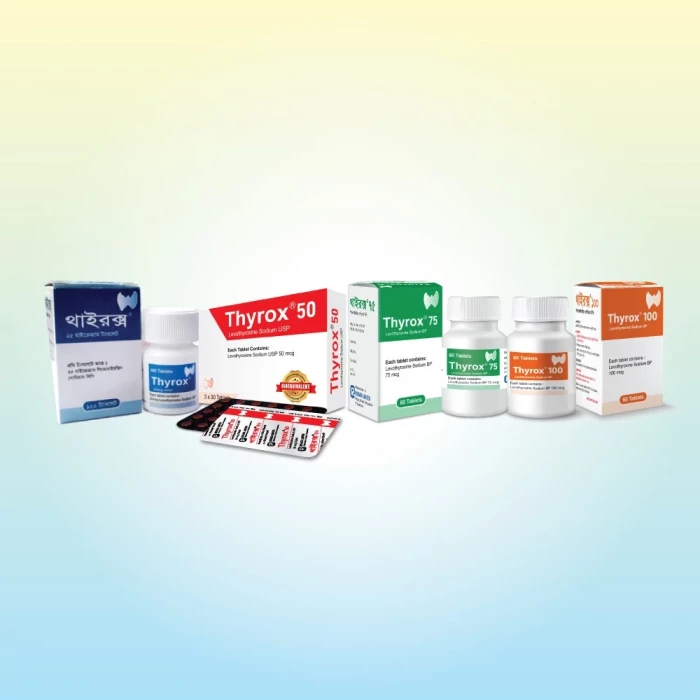
✔ 100% Authentic Product
👁️ Currently Viewing 6649
Thyrox 50mcg Tablet 30pcs
Levothyroxine Sodium 50mcg is used to treat an underactive thyroid gland (hypothyroidism). It helps regulate energy and metabolism by replacing the hormone that the thyroid gland fails to produce in adequate amounts.
Discount
Price: ৳ 65
MRP:
৳
66
2%
Off

100% Genuine Products, Guaranteed

Safe & Secure Payments, Always

Fast, Secure & Efficient Delivery

Proper Packaging
 Cash on Delivery - All over Bangladesh
Cash on Delivery - All over Bangladesh Regular Delivery - 12-24 Hours, Dhaka City* Charge Tk.39-59
Regular Delivery - 12-24 Hours, Dhaka City* Charge Tk.39-59 Regular Delivery - 24-48 Hours, Other Cities* Charge Tk.99-110
Regular Delivery - 24-48 Hours, Other Cities* Charge Tk.99-110
 ফ্রি ডেলিভারিঃ - ৯৯৯ টাকা+ অর্ডারে, ঢাকা
শহরে
ফ্রি ডেলিভারিঃ - ৯৯৯ টাকা+ অর্ডারে, ঢাকা
শহরে ফ্রি ডেলিভারিঃ - ২৯৯৯ টাকা+ অর্ডারে, ঢাকার
বাহিরে
ফ্রি ডেলিভারিঃ - ২৯৯৯ টাকা+ অর্ডারে, ঢাকার
বাহিরে
100% Genuine Products, Guaranteed
Safe & Secure Payments, Always
Fast, Secure & Efficient Delivery
Proper Packaging
 Cash on Delivery - All over Bangladesh
Cash on Delivery - All over Bangladesh Regular Delivery - 12-24 Hours, Dhaka City* Charge Tk.39-59
Regular Delivery - 12-24 Hours, Dhaka City* Charge Tk.39-59 Regular Delivery - 24-48 Hours, Other Cities* Charge Tk.99-110
Regular Delivery - 24-48 Hours, Other Cities* Charge Tk.99-110 ফ্রি ডেলিভারিঃ - ৯৯৯ টাকা+ অর্ডারে, ঢাকা
শহরে
ফ্রি ডেলিভারিঃ - ৯৯৯ টাকা+ অর্ডারে, ঢাকা
শহরে ফ্রি ডেলিভারিঃ - ২৯৯৯ টাকা+ অর্ডারে, ঢাকার
বাহিরে
ফ্রি ডেলিভারিঃ - ২৯৯৯ টাকা+ অর্ডারে, ঢাকার
বাহিরে
✅ Description:
Levothyroxine (Thyroid Hormones)
- Hypothyroidism: Used for replacement therapy in all forms of underactive thyroid function.
- Post-Thyroidectomy: Helps replace missing thyroid hormone after the removal of the thyroid gland.
Mechanism of Action:
- Levothyroxine: A synthetic thyroid hormone identical to thyroxine (T4) produced by the thyroid gland. It replaces the missing thyroid hormone, crucial for normal growth, development, and metabolism.
- Conversion to T3: About 30% of T4 is converted to the more active triiodothyronine (T3) in peripheral tissues, which is essential for regulating metabolic processes.
Take on an empty stomach with a full glass of water, 30 minutes to 1 hour before meals.
- Inform your doctor if you have a history of kidney disease, heart disease, or pancreas problems.
Safety Advices

Alcohol
UNSAFE
Consumption of alcohol is not recommended during management with Thyrox 50mcg Tablet.

Pregnancy
CONSULT YOUR DOCTOR
Thyrox 50mcg Tablet is not recommended for use in pregnant women unless necessary. Consult your doctor for advice.

Breastfeeding
CONSULT YOUR DOCTOR
Thyrox 50mcg Tablet is not recommended for use in breastfeeding women unless necessary. Consult your doctor for advice.

Driving
CAUTION
Thyrox 50mcg Tablet does not usually affect your ability to drive.

Kidney
CONSULT YOUR DOCTOR
Thyrox 50mcg Tablet should be taken with caution in patients with severe kidney disease. Consult your doctor for advice.

Liver
CONSULT YOUR DOCTOR
Thyrox 50mcg Tablet should be taken with caution in patients with severe liver disease. Consult your doctor for advice.
✔️ Uses of Thyrox 50mcg Tablet
- Hypothyroidism
- TSH suppression
- Myxoedema coma
✔️ How does Thyrox 50mcg Tablet work?
Thyrox 50 contains synthetic levothyroxine, which is identical to the natural thyroid hormone T4. In the body, T4 is converted to the more active triiodothyronine (T3). Levothyroxine helps normalize thyroid hormone levels, thus regulating metabolism, energy production, and various bodily functions.
✔️ Common side effects include:
- Palpitations
- Vomiting
- Anxiety
- Diarrhea
- Menstrual irregularities
- Weight loss
- Nervousness
- Restlessness
- Flushing
- Increased bone resorption and reduced bone mineral density
✔️ Quick Suggestions:
- Used for treating hypothyroidism regardless of the cause.
- Should not be used for transient hypothyroidism during the recovery phase of subacute thyroiditis.
- Employed in managing goiters, nodules, and post-radiological or surgical treatment of thyroid cancer.
- Used to counteract the goitrogenic effects of certain medications, such as lithium.
- Utilized in suppression tests.
✔️ How should Thyrox 50 be taken?
- Take Thyrox 50 on an empty stomach with a full glass of water.
- Administer it 30 minutes to 1 hour before meals.
- Avoid eating, drinking milk, or consuming tea within two hours after taking the medication.
✔️ Pharmacology
- Synthetic Levothyroxine (Thyroxine or T4):
- Identical to the natural hormone T4 produced by the thyroid gland.
- Approximately 30% of T4 is converted to the more active triiodothyronine (T3) in peripheral tissues.
- Major carrier: Thyroxine Binding Globulin (TBG), which protects T4 from metabolism and excretion, giving it a long half-life in circulation.
- Only about 0.03% of total T4 in plasma is unbound.
- The half-life of T4:
- Normal: 6 to 7 days.
- Hyperthyroidism: 3 to 4 days.
- Hypothyroidism: 9 to 10 days.
- Conditions like nephrosis or hepatic cirrhosis or certain drugs can shorten the half-life of T4.
- Liver: Primary site for degradation of thyroid hormones. T4 undergoes conjugation with glucuronic and sulfate groups, facilitating urinary excretion.
- Enterohepatic Circulation: Thyroid hormones are hydrolyzed in the intestine and reabsorbed.
- Due to the long half-life of T4, a steady blood level of the biologically more active T3 can be maintained with a single daily dose, ensuring consistent therapeutic effects once the correct dosage is established.
✔️ Dosage & Administration of Thyrox 50mcg Tablet
Adults:
Mild Hypothyroidism:
- 1.7 mcg/kg or 100-125 mcg daily; maximum 300 mcg/day.
For individuals over 50 years old (or under 50 with cardiovascular disease):
- Initial dose: 25-50 mcg/day.
- Adjust the dose by 12.5-25 mcg every 6-8 weeks.
For individuals over 50 years with cardiovascular disease:
- Initial dose: 12.5-25 mcg/day.
- Adjust the dose by 12.5-25 mcg every 4-6 weeks until the patient reaches euthyroid status and serum TSH levels normalize.
Severe Hypothyroidism:
- Initial dose: 12.5-25 mcg/day.
- Adjust by 25 mcg every 2-4 weeks as needed.
Subclinical Hypothyroidism:
- Initial dose: 1 mcg/kg daily may be sufficient, or if replacement therapy is not started, monitor the patient's clinical status and TSH levels annually.
TSH Suppression:
- For thyrotropin-dependent well-differentiated thyroid cancer: doses over 2 mcg/kg/day may be administered to suppress TSH to less than 0.1 MIU/L.
- For benign nodules and nontoxic multinodular goitre: target TSH levels are 0.1-0.5 MIU/L for nodules and 0.5-1 MIU/L for multinodular goitre.
Children
Hypothyroidism:
Age 1-3 months:
- 10-15 mcg/kg/day.
- For patients at risk of cardiac failure, start with a lower dose (25 mcg/day).
- If initial serum T4 is lower than 5 mcg/dL, start treatment at a higher dose (50 mcg/day).
Age 3-6 months:
- 8-10 mcg/kg/day or 25-50 mcg/day.
Age 6-12 months:
- 6-8 mcg/kg/day or 50-75 mcg/day.
Age 1-5 years:
- 5-6 mcg/kg/day or 75-100 mcg/day.
Age 6-12 years:
- 4-5 mcg/kg/day or 100-125 mcg/day.
Over 12 years:
- 2-3 mcg/kg/day or 150 mcg/day.
For children with severe or chronic hypothyroidism:
- Start with 25 mcg/day and adjust the dose by 25 mcg weekly.
✔️ Tell your doctor if you are taking or recently taken any other medicines, including medicines obtained without a prescription or the following:
- Medicines used to manage diabetes
- Anticoagulants such as warfarin, dicoumarol (used to thin the blood)
- Amiodarone (used to manage some heart conditions)
- Aspirin
- Medicines containing estrogen (e.g. used for hormone replacement therapy or oral contraceptives)
- Antidepressants (e.g. sertraline and tricyclic antidepressants such as amitriptyline, and imipramine)
- Chloroquine and proguanil (used in malaria and rheumatic diseases)
- 5-fluorouracil, imatinib, and sunitinib (used for abnormal outgrowth)
- Medicines used to control the heart rate (such as digoxin)
- Medicines that stimulate the sympathetic nervous system such as adrenaline
- Carbamazepine, phenytoin, or barbiturates (used to manage epilepsy or seizures)
✔️ Contraindications
Hypersensitivity
✔️ Pregnancy & Lactation
The need for Levothyroxine may increase during pregnancy. Although thyroid hormones are excreted in small amounts in breast milk, appropriate replacement doses are generally required to maintain normal lactation. Always consult your doctor for advice specific to your situation.
✔️ Precautions & Warnings
- Take Thyrox 50 on an empty stomach.
- Avoid taking antacids, calcium, iron supplements, or multivitamins within 4 hours of taking Thyrox 50.
- Report any symptoms like diarrhea, anxiety, irritability, disturbed sleep, shaking hands, or chest pain to your doctor.
- Regularly monitor your hormone levels and report any significant changes in body weight to your doctor.
- Inform your doctor before switching brands of Thyrox 50 as not all brands have the same effect.
✔️ Storage Conditions:
Store Thyrox 50 in a cool, dry place protected from light. Keep it out of the reach of children.
⚠️Disclaimer:
At ePharma, we’re committed to providing accurate and accessible health information. However, all content is intended for informational purposes only and should not replace medical advice from a qualified physician. Please consult your healthcare provider for personalized guidance. We aim to support, not substitute, the doctor-patient relationship.




